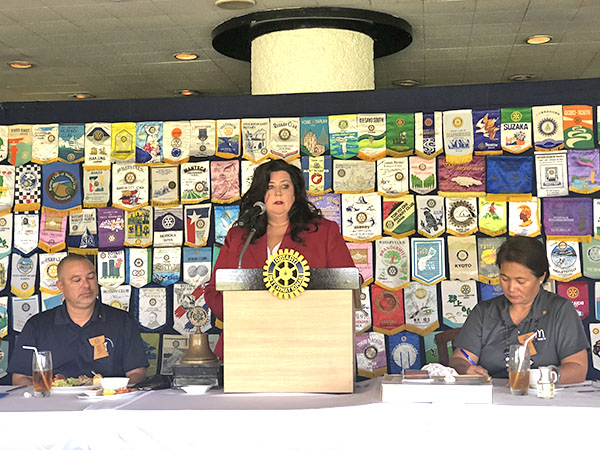OAG Consumer Division: Rent hikes still illegal
Attorney General’s Office consumer counsel Michele Harris delivering her presentation Tuesday during the Saipan Rotary Club meeting at Hyatt. (Erwin Encinares)

Any rent increases that were enforced since Super Typhoon Yutu hit the Commonwealth in October 2018 are considered illegal and may be subject to possible legal action, according to the Office of the Attorney General last Tuesday.
Consumer counsel Michele Harris told the Rotary Club of Saipan at their meeting at the Hyatt Regency Saipan that any price increases for necessities such as rent and food are considered illegal since Gov. Ralph DLG Torres declared a price freeze in the wake of the super typhoon.
A price freeze can only be declared by the CNMI governor after a state of disaster has been declared. It effectively “freezes” any form of price increases—to include consumables such as food and includes rent—during a state of disaster and is renewed every month.
Any act against this—increasing prices of an item much higher than what is considered reasonable or fair—is called price gouging.
According to Harris, anyone or any entity found guilty of price gouging may face both civil and criminal penalties.
“On the criminal side…you can be looking at a felony with up to a $10,000 fine and possibly a year in [prison],” she said, adding that charges are cumulative in nature, meaning the penalties for the charges add up.
Harris noted that her office has already taken on complaints of apartments increasing their rent during the declaration of a price freeze.
“We were actually able to get a rent increase reversed so that the tenants would not have to pay the rent increase,” Harris said. “We are proactive out there in getting involved and investigating complaints as they come into the office and doing what we can,” adding that, even through there is an enforcement arm, she still believes educating both consumers and the businesses are important.
“…The whole goal of the consumer division is to make sure we have a fair and safe consumer market for everyone,” she said.
Torres, according to Harris, declared a price freeze last Jan. 24, 2019. It was first declared in October 2018 and has been renewed every 30 days since then.






